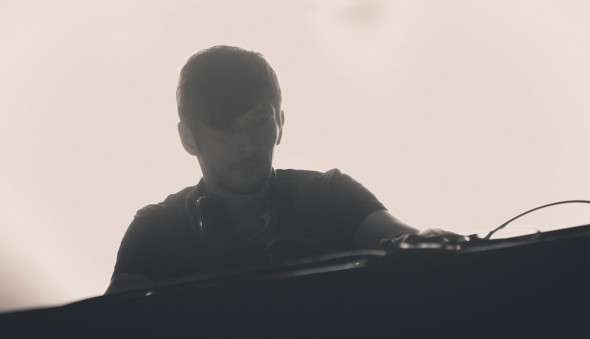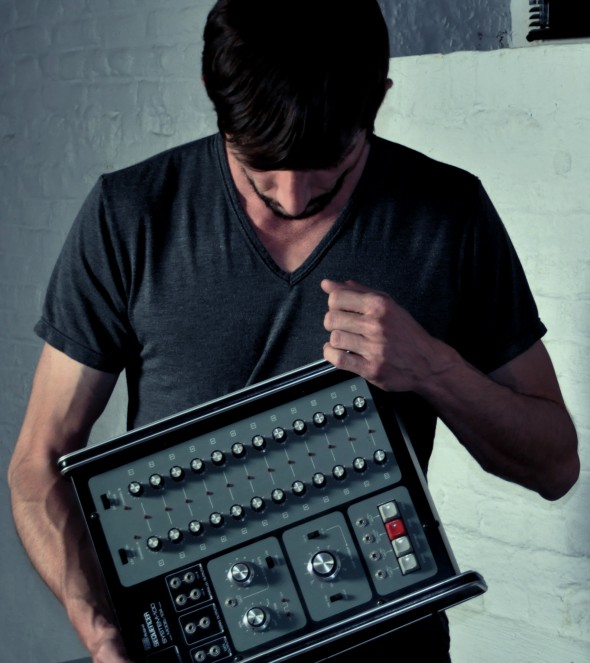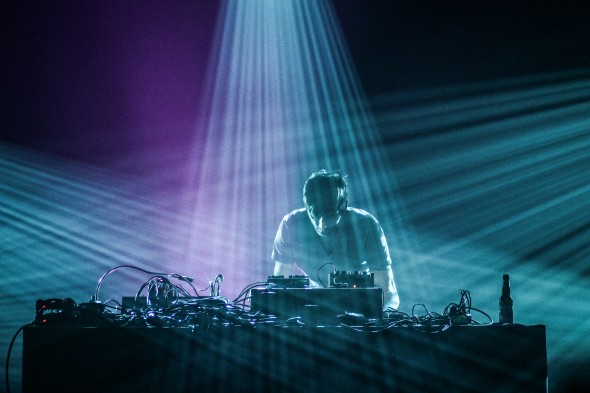It takes a lot to impress people in this scene as the years pass us by but Yves De Mey has done it seamlessly of late, more so than ever. It’s even harder to find someone with a warm honest attitude and approach, and the ability to convey it goes a long way to securing a kind of exposure that’s derived from having a genuine love for building the community devoid of ego, as opposed to tiring grabs for attention. It’s an event in it’s own modest way, and it’s this perspective that’s been the uncompromising basis for his success across Sandwell District, Opal Tapes, Semantica Records and the Athenian based label, Modal Analysis. That’s even before touching on his own imprint Archives Interieures, as well as a fresh project under the new aliase Grey Branches titled ‘Lower Bounds’ on Inner Surface Music.
Above all the noise and traffic of mediocrity, inbound collaborations alongside studio partner Peter Van Hoesen as Sendai as well as remix duties, sound editing and designing for a host of projects will litter the remainder of the year. We’d also strongly advise getting yourself along to the imminent Grey Branches live shows, with dates shortly confirmed. Experimental exploration and subterranean tunnel surveillance would be an accurate summary.
–
Kn: The list of music you’ve produced for film, installations, performing arts and commercials is lengthy and impressive. How does this approach differ from other musical pursuits? How does context influence your process, mood, approach and the final outcome?
YDM: Context is everything. When making music or sound for other media or situations, you basically start working from some sort of consensus, i.e. it’s not “stand-alone” music, and the work has to deal with for instance the narrative and atmosphere of a script, a certain environment, movement,…. My contribution serves a purpose and often needs to meet laid-out criteria. It’s always a very interesting challenge to work within a frame without ending up as some kind of jukebox. Often, the restrictions you have to deal with make for a complicated process where you want the personality of your sounds to go hand in hand with the personality of someone else’s ideas or concept. When working on my solo stuff, I don’t have to think about the functionality too much, and I set my own standards, and that’s usually easier than working for or with someone else.
Making contextual music serves a purpose, and I want to maximise the usefulness of my work without minimising what I think I stand for. I especially try hard not to let my ego dominate the approach, because that’s definitely a mood killer. In general, I simply jump into those projects, head first, and if all goes well, I find my way pretty quick. There’s been exceptions, but only a few. Most of the time I get asked by people who know what I do, and they choose me because they feel I can really add something to their work. So I can usually enjoy a certain creative freedom. That said, I don’t want it to be easy; I’ve learned so much from working with others, ranging from technical things over content and dramaturgy to abandoning your ego.
Kn: Has the resulting accumulation of experience in the above mentioned fields combined with say the experience of playing live sets as Sendai, accounted for the way you approach things in order to keep maturing as an artist and transgress? And if so, specifically how?
YDM: Definitely. I’ve never had the feeling I’ve reached a certain point where I wanted to be, it’s all one big process, and every step you make might bring you closer to something, but at the same time, with each step, there’s so many new options to explore. I don’t think I can unlearn something, so I can only use every single bit of experience to push myself further. One of the important things I’ve learned over the years is to make quicker decisions. I try not to fret too much, and if something doesn’t work, I make it work by doing something radical to it or I totally trash the whole thing. That being said, I can be busy with the same detail for a couple of days, simply because I’ve learned to enjoy the complexity of things. I also enjoy doing things I’m not really good at, just for the sake of getting better, and at the same time knowing it will help you at a certain point in time. I guess that’s my version of maturing as an artist.
Kn: What are the things you’ve been evaluating lately or ideas in visceral methodology you’ve been exploring to facilitate that transgression?
YDM: It’s not a recent theme, but rather something that’s been in my head or system already for quite some time: restriction. I always have to slap my hand, because I have the tendency to make things too charged. I have a hard time not to keep on adding layers and layers, and that’s a waste of time and energy. On the other hand (no pun intended) it’s probably my approach of making tracks, and in the final outcome, there’s hardly ever the first four or five layers I recorded. My tracks constantly mutate in the process of becoming, and I let things happen and lead to other results. This is something that certainly applies to my new Grey Branches project. For my other, more experimental stuff, the recording and mixing process is pretty straightforward, and I don’t have to ‘suffer’ so much.
Kn: Looking back on the experimental output you’ve released to date, would you say that you’re still content and happy with that output? In what way does that cognitive reflection influence and challenge your output or your approach on today and tomorrow?
YDM: In retrospect, I’m probably happier with those tracks being released than with the tracks itself, but I’d never release something that i’m not content with. There’s always room for improvement, and I’m sure I’ve never delivered perfection, but I accept that. And It’s always a great feeling when an EP or album is done, because I can really feel it slip out of my system. I have no regrets whatsoever about any of those releases. I can’t say I think much about my back catalogue in regard to my actual work. I really work in the present and don’t look back. The real challenge for me is to come up with compositions that make more sense to me than ever before, with sounds that have a different quality. I patch and program vast amounts of sound, and I feel the need to surprise my ears. That’s already quite a challenge, because there’s tons of amazing and beautiful sounds out there.
Kn: After gaining some momentum in the studio, was there a specific gig or moment that you realised that what you did on stage as an experimental artist was affecting people?
YDM: Not that I recall. I suppose my drive to make things has always been more relevant to me than the appreciation I might have gotten from performing. That’s not intended to be a pretentious statement whatsoever; I make music because that’s what I want and need to do. I’m obviously very happy when it affects people, and it definitely gives me an extra push, but while working, I’m the audience of one.
Kn: From all your experience as a studio engineer, studying as a film student and production experience ranging from your formative years in Drum & Bass to scoring feature length films like ‘Hide And Seek’, what are some of the more important things you’ve learnt about yourself over the years, both as an individual, artist, in the studio or life in general?
YDM: I’ve learned that ego is a burden when applied in a stubborn fashion. Being honest with yourself helps when working with other people, especially at times when you feel less confident about what you’re doing. Saying “no” is helpful as well. Choose wisely, especially regarding smaller, non-profit work. Nothing against non-profit, but music and sound design is my job, and I have a child to feed. I’ve also learned to stay open-minded, but at the same time my bullshit detector’s threshold has never been so low. I don’t like the idea of wasting time, I want things to move. I try to maintain a romantic vision of what i’m doing, but i’ve noticed I work more efficiently when I focus in a very practical way. All these things apply to life in general as well, I guess. It’s all the same me anyway.
Kn: I’ve been listening to your new EP, ‘Lower Bounds’, under your new Grey Branches alias. The EP is a well measured account in delivering impact. The depth in sounds and textures, the spaces they occupy and the ones they don’t come together to offer a beautifully crafted and sincere EP. ‘Binate’ has been on repeat for a few hours now. I get a little obsessed like that. What do you hope to explore with the new alias with all this in mind?
YDM: Thank you for your kind words. With Grey Branches, I want to see how far I can go in combining my desire to experiment with a somewhat straightforward and probably functional dance floor feel. It’s fun to do, but rather tough at the same time. I find it much more difficult to produce those Grey Branches tracks than any of my other work. I want to work towards a stripped down, energetic and heavy sound without it resulting in bog standard Techno.
Kn: What can we expect from you in terms of future releases, shows, future projects or any other form of creative output that is currently resonating close to your soul?
YDM: There’s a few Grey Branches gigs coming up, very excited about those. Working on that right now, making lots of new tracks, ending up on a GB full album. Very soon, with Sendai, we’ll start on some new things as well, I have a couple of remixes to finish, an EP for Opal Tapes, another full length as Yves De Mey, and after summer there will be a full album on Spectrum Spools. That one is already done, ready for mastering. I’m very happy with that one. It’s probably the most organic sounding record I’ve done so far, and I can’t wait to play that one live as well. Besides releases, there’s a lot of sound editing/design/mixing stuff coming my way. I think from May till December, it’s going to be full-on all the time.
–
George Alatakis, 10th February 2015



